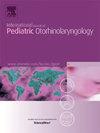IQGAP3 deficiency leads to non-syndromic hearing loss via inhibition of CDC42 enzyme activity
IF 1.2
4区 医学
Q3 OTORHINOLARYNGOLOGY
International journal of pediatric otorhinolaryngology
Pub Date : 2025-04-15
DOI:10.1016/j.ijporl.2025.112358
引用次数: 0
Abstract
Background
Genetic factors are important causes of congenital hearing loss. To better understand hereditary hearing loss, we performed in-depth clinical and molecular analysis of families with congenital hearing loss and a new disease-related gene, IQGAP3, was identified in this process. This gene encodes a protein that belongs to the IQGAP family which is well known as a GTPase-activating protein involved in various cellular functions. However, there is no research on the relationship between IQGAP3 and the auditory system.
Method
This study was conducted at Guangzhou Women and Children's Medical Center and Nantong University from 2019 to 2023 to confirm the relationship between defective IQGAP3 and hearing loss, and further explore the underlying molecular mechanism. We constructed the iqgap3 knockdown zebrafish model, primary mouse inner progenitor cell model and IQGAP3-knockout HEK293T cell line for this research.
Result
We found that IQGAP3 deficiency led to abnormal development of the auditory system and impaired auditory function in zebrafish. In vitro studies showed that loss of this gene's function resulted in a 40.29 % reduction in EdU-positive cells and a 44.25 % decrease in Ki67-positive cells in mouse inner ear progenitor cells, indicating reduced proliferation. This can be linked with inhibition of CDC42 enzymatic activity and the blockade of the Wnt-catenin pathway.
Conclusion
We identified IQGAP3 as a novel potential causative gene in hereditary hearing loss. Our findings provide important insights into the molecular basis of hereditary hearing loss.
IQGAP3缺乏通过抑制CDC42酶活性导致非综合征性听力损失
遗传因素是先天性听力损失的重要原因。为了更好地了解遗传性听力损失,我们对先天性听力损失家族进行了深入的临床和分子分析,并在此过程中发现了一个新的疾病相关基因IQGAP3。该基因编码一种属于IQGAP家族的蛋白质,该蛋白质是一种众所周知的gtpase激活蛋白,参与各种细胞功能。然而,目前还没有关于IQGAP3与听觉系统之间关系的研究。方法于2019 - 2023年在广州市妇女儿童医学中心和南通大学开展IQGAP3缺陷与听力损失的关系研究,并进一步探讨其分子机制。本研究构建了iqgap3敲除斑马鱼模型、原代小鼠内祖细胞模型和敲除iqgap3的HEK293T细胞系。结果IQGAP3缺失导致斑马鱼听觉系统发育异常,听觉功能受损。体外研究表明,该基因功能的缺失导致小鼠内耳祖细胞中edu阳性细胞减少40.29%,ki67阳性细胞减少44.25%,表明增殖能力降低。这可能与CDC42酶活性的抑制和Wnt-catenin通路的阻断有关。结论IQGAP3是遗传性听力损失的一个新的潜在致病基因。我们的发现为遗传性听力损失的分子基础提供了重要的见解。
本文章由计算机程序翻译,如有差异,请以英文原文为准。
求助全文
约1分钟内获得全文
求助全文
来源期刊
CiteScore
3.20
自引率
6.70%
发文量
276
审稿时长
62 days
期刊介绍:
The purpose of the International Journal of Pediatric Otorhinolaryngology is to concentrate and disseminate information concerning prevention, cure and care of otorhinolaryngological disorders in infants and children due to developmental, degenerative, infectious, neoplastic, traumatic, social, psychiatric and economic causes. The Journal provides a medium for clinical and basic contributions in all of the areas of pediatric otorhinolaryngology. This includes medical and surgical otology, bronchoesophagology, laryngology, rhinology, diseases of the head and neck, and disorders of communication, including voice, speech and language disorders.

 求助内容:
求助内容: 应助结果提醒方式:
应助结果提醒方式:


